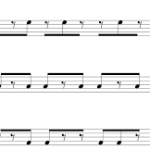
Learn a new language by singing
Hello Dear Reader
Today I am thinking about foreign languages. People who come from monolingual families and who are raised in the UK school system are notorious across the world for being poor at speaking foreign languages.
My Kenyan friend Kim once told me a joke that I have repeated to knowing laughter on many occasions since: ‘ People who speak more than two languages are called multi-lingual, people who speak two language are called bilingual….people who speak one language are called British’
This may be an unfair generalisation but it applies to me, no argument. I learned French for 3 years at school and German for 1 year. I lived in Switzerland for the best part of a year. My fiancé is Spanish. And yet, I speak only English. For shame.
 This week my mother-in-law-to-be has been visiting from Zaragoza, Spain. We have known each other for 7 years and yet we can hardly speak. ‘Frustration’ is hardly the word. We can share the odd joke and passing comment about the weather, a meal or my outfit. We even managed to co-ordinate a wedding dress trip between us this visit. But communication remains minimal.
This week my mother-in-law-to-be has been visiting from Zaragoza, Spain. We have known each other for 7 years and yet we can hardly speak. ‘Frustration’ is hardly the word. We can share the odd joke and passing comment about the weather, a meal or my outfit. We even managed to co-ordinate a wedding dress trip between us this visit. But communication remains minimal.
You can imagine my excitement therefore when I came across a new article in Psychology of Music journal that tested the efficacy of singing for foreign-language learning. The article, by Arla Good and colleagues, tested the theory that song is a more effective way of teaching a new language than spoken passages.
Might there be hope for my terrible Spanish, if only I sing along?
Theory
Singing is used the world over as a means to facilitate learning. Surprisingly however, there is little empirical evidence that singing boosts learning of new words anymore than learning by listening to speech or speaking normally.
Earlier this year Hi Jee Kang and I published an article where we found that background music boosted learning of Mandarin Chinese as compared to exactly the same material that lacked a musical backing track. We proposed several mechanisms for this effect, including:
1) Music grabs more attention, which is then directed to the sound of the new words
2) The structure of the music facilitates processing of the structures in the new words
3) Song creates a more elaborate memory trace, made from multiple sources and stronger as a result.
Interestingly we found that the music did not help with pronunciation, only basic memory for the new words and phrases in Chinese.
Method
The new study took place over a 2-week learning period. 38 Spanish-speaking children from a junior school (age 9-13) in Ecuador were taught a novel lyrical passage, one group (16 students) heard the lyrics as a song and one group (22 students) heard them as a poem spoken rhythmically.
None of the children had been given any formal English instruction, though there is no doubt they had been differentially exposed to English through the media.
 The children were tested after the 2 week testing session and also, uniquely, 6 months later. Each child received 20 exposures to the lyrics before testing. The lyrics contained 29 words in total and the children were tested on their ability to translate 10 of the words (like ‘table’, ‘feet’, and ‘daddy’). The children were also tested on their ability to recall the whole lyrics and their pronunciation was scored.
The children were tested after the 2 week testing session and also, uniquely, 6 months later. Each child received 20 exposures to the lyrics before testing. The lyrics contained 29 words in total and the children were tested on their ability to translate 10 of the words (like ‘table’, ‘feet’, and ‘daddy’). The children were also tested on their ability to recall the whole lyrics and their pronunciation was scored.
After 6 months 13 of the children (7 from the spoken condition) were available for re-testing.
Results
Pronunciation – overall consonants were pronounced better than vowels. There were no differences between the groups in their pronunciation of consonants but the children who had heard the lyrics on song form were better at pronouncing the vowels.
Recall – Children in the sung condition recalled more words in sequence than the children in the poem condition. The children from the song condition also showed fewer syllable errors, suggesting that the song had facilitated the rhythmic structure in the lyrics.
Translation – Of the 10 new English words, the singing children were able to recall on average 4 whereas the children in the poem group recalled 2.6 – a significant difference.
The long-term recall test had low participant numbers but the data suggested that the children in the singing group had maintained their advantage in better recall of the lyrics. However, the group difference in translation success had disappeared.
Conclusions
These findings support the use of sung lyrics to teach children words in a new language, suggesting that they may be able to learn twice as many in the short-term.
In the long-term the children may lose their overt knowledge of how to translate new foreign words correctly but they seem to retain a new foreign song more than a poem, which may form the basis for quicker learning and better pronunciation down the line.
 The findings support one of Hi Jee’s suggestions: music helps to facilitate the processing of language structure through the medium of rhythm. Sadly there was no evidence to support or rule out other reasons why music facilitated the childrens’ learning, such as grabbing attention (through enjoyment) and building a stronger memory trace. Testing these theories, and differentiating them, will have to be the remit of future studies.
The findings support one of Hi Jee’s suggestions: music helps to facilitate the processing of language structure through the medium of rhythm. Sadly there was no evidence to support or rule out other reasons why music facilitated the childrens’ learning, such as grabbing attention (through enjoyment) and building a stronger memory trace. Testing these theories, and differentiating them, will have to be the remit of future studies.
Right – I am going to practice what they preach and listed to a few Spanish tracks to see if it improves my communication with my future in-laws. There is still time before the wedding!
Paper: Good, A.J., Russo, F.A., & Sullivan, J. (2014) The efficacy of singing in foreign language learning. Psychology of Music, DOI: 10.1177/0305735614528833
3 Comments
Daniel
Hi Dr. Williamson,
The case of Timothy Doner is very impressive and, actually, he advises to sing and memorize many songs to improve the knowledge of other languages. A couple of links about him:
http://www.youtube.com/watch?v=FOiXtWcQ8GI
http://www.youtube.com/watch?v=t-V-MT6IHto
Greetings,
Daniel
Mr. Reyes
I have been teaching a free English class to my community in Japan called, “Learning English through The Beatles” for over a year. I felt that people were more enthusiastic about learning a new language when one introduces music into the curriculum. The most important thing I observed was that the students were learning together, which made it a social norm for the community and helped reestablish what was learned. For example, if after class one forgets a word or concept, someone else in the class could assist them and vice versa. It’s the phenomena of Emergence Theory in musical form. For anyone learning a new language, I suggest taking a class taught through music with friends and/or family.
vicky
What a great idea for a language class! You have lucky students. All the best, Vicky